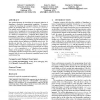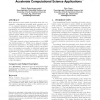612 search results - page 9 / 123 » Hardness assumptions in the foundations of theoretical compu... |
103
click to vote
ATAL
2010
Springer
14 years 11 months ago
2010
Springer
We consider the computational complexity of pure Nash equilibria in graphical games. It is known that the problem is NP-complete in general, but tractable (i.e., in P) for special...
SIGSOFT
2007
ACM
15 years 10 months ago
2007
ACM
The standard language for describing the asymptotic behavior of algorithms is theoretical computational complexity. We propose a method for describing the asymptotic behavior of p...
ICS
2010
Tsinghua U.
15 years 7 months ago
2010
Tsinghua U.
: Starting with the work of Ishai-Sahai-Wagner and Micali-Reyzin, a new goal has been set within the theory of cryptography community, to design cryptographic primitives that are s...
STACS
2010
Springer
15 years 4 months ago
2010
Springer
This paper presents the following results on sets that are complete for NP. (i) If there is a problem in NP that requires 2nΩ(1) time at almost all lengths, then every many-one N...
FPGA
2009
ACM
15 years 4 months ago
2009
ACM
Many natural processes exhibit exponential decay and, consequently, computational scientists make extensive use of e−x in computer simulation experiments. While it is common to ...


